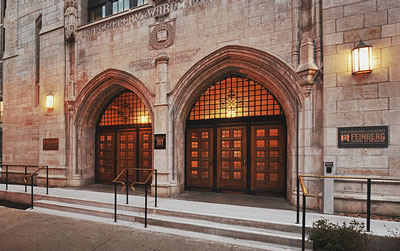-

Examining Early Outcomes of Feinberg’s Curriculum Redesign
A new study published in Academic Medicine reports early outcomes on student achievement, confidence and engagement after the medical school’s curriculum redesign.
-

Two Years of Construction Progress on the Simpson Querrey Biomedical Research Center
Chris Jones, senior superintendent at Power Construction, shares an update on the construction of the Louis A. Simpson and Kimberly K. Querrey Biomedical Research Center.
-

PA Program Celebrates 50th Anniversary of the Profession With PA Week
The Feinberg Physician Assistant Program raised awareness about the profession and celebrated current students and past graduates as part of National PA Week.
-

Medical Student Pursues Innovation in Healthcare With MBA
Rosemary Hines Fuller, a fourth-year medical student, is spending this year at the Kellogg School of Management earning her MBA as part of Feinberg’s joint degree.
-

New Insights Into Herpes Virus Could Inform Vaccine Development
Research published in Proceedings of the National Academy of Sciences provides new insights into antibodies that block the Epstein-Barr virus from infecting human cells.
-

How Having a Stroke Renewed a Physician’s Faith in His Profession
Todd Kuiken, ’90 MD, PhD, ’91 ’95 GME, professor of Physical Medicine and Rehabilitation, Surgery and Biomedical Engineering at Northwestern shares his personal story.
-

Northwestern Alumni Return to Share Insight Into Industry
Feinberg alumni discussed their careers in biotechnology and pharmaceuticals and highlighted common pitfalls for physicians to avoid when transitioning to working in industry.
-

Trial Finds No Survival Benefit to Aggressive Breast Cancer Procedure
Women with invasive breast cancer who were treated with an aggressive lymph node removal saw no survival benefit compared to those who received a less invasive procedure, according to a new clinical trial.
-

Previously Unknown Gene Mutation May Increase Risk for Heart Disease
A newly discovered gene mutation may increase a patient’s risk of genetic heart disease, presenting a target for therapy or genetic screening down the road.
-

Workshop Teaches Students Interprofessional Teamwork
Medical, nursing, physician assistant and physical therapy students teamed up during a recent interactive training session.
-

Early- and Mid-Career Investigators Recognized by NIH
Two Northwestern Medicine scientists have received NIH Director’s Awards, which fund innovative research with high-impact potential.
-

Medical Education Day Celebrates Feinberg Educators and Provides Teaching Tools
Feinberg faculty, students and staff gathered to recognize medical education through workshops, lectures and presentations at the seventh annual Medical Education Day.
-

Students and Trainees Study the Immune System to Improve Heart Tissue Repair
Northwestern Medicine scientists have demonstrated the potential of targeting inflammatory pathways in order to limit tissue damage and improve repair after a heart attack.
-

Unexpected Findings Uncover New Understanding of Gene Expression
Northwestern Medicine scientists have discovered surprising findings about an enzyme central to gene expression and mutated in many cancers.
-

Toxic Genetic Material’s Origins Discovered
A Northwestern Medicine study found a novel chemical transformation in the formation of colibactin, a toxic agent produced by gut bacteria, including certain strains of E. Coli.
-

Understanding Key Enzyme’s Role in Embryonic Development
A new Northwestern Medicine study reveals surprising findings about an enzyme called Set1A and its function in embryonic stem cell self-renewal and differentiation.
-

Feinberg Professor Strives to Reduce Gunshot Mortality in Chicago
Mamta Swaroop, MD, associate professor of Surgery, leads the Chicago South Side Trauma First Responders Course, a free program giving Chicago community members the tools to render first aid to trauma victims.
-

TIME Lectures Highlight New Ideas and Innovations in Medical Education
The school year’s first TIME talk, a monthly lecture series at Feinberg on innovations in medical education, was dedicated to reducing gender disparities in the field of surgery.
-

HIV Infection Hijacks Intracellular Highways
A Northwestern Medicine study found the human immunodeficiency virus uses proteins called diaphanous-related formins to hijack the cytoskeleton of healthy cells.
-

Research Progresses on $3.5M HRSA Grant
Several research projects focused on addressing gaps in the medical care of diverse populations are underway at the Center for Primary Care Innovation, funded by a $3.5 million grant from the Health Resources and Services Administration.






